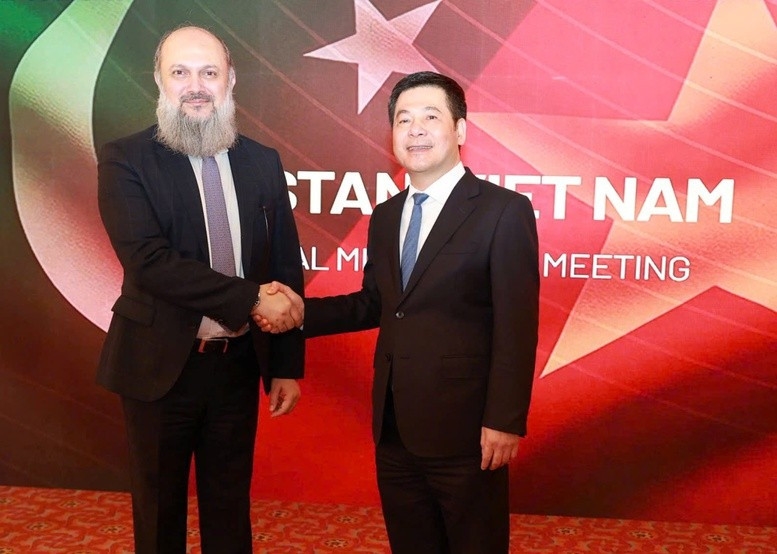The move was made during a working visit to Pakistan by Minister of Industry and Trade Nguyen Hong Dien from October 13 to 15, according to the Ministry of Industry and Trade.
    |
 |
|
Vietnamese Minister of Industry and Trade Nguyen Hong Dien (right) and Pakistani Minister of Commerce Jam Kamal Khan (Photo: baochinhphu.vn) |
On October 14, the Vietnamese minister held talks with Pakistani Minister of Commerce Jam Kamal Khan in Islamabad to discuss measures for strengthening bilateral trade and investment relations.
During the talks, Dien said that Vietnam considers Pakistan one of its most promising partners in South Asia, given the latter's strategic location in the manufacturing – trade network from Southeast Asia to South Asia and the Middle East.
However, he pointed out that bilateral trade remains modest compared to potential. It reached about 705 million USD in 2023, 850 million USD in 2024, and nearly 600 million USD in the first nine months of 2025.
To further promote economic and trade ties, the Vietnamese minister proposed the two countries remove tariff barriers for each other's goods, improve transport and logistics connectivity, and facilitate business partnerships in such fields as textiles – garment, leather – footwear, Halal food, agro-processing, mechanical engineering, materials, energy, pharmaceuticals, digital technology, and innovation, which the two sides have complementary advantages in.
He also asked Pakistan to review high import taxes and technical requirements that have limited the entry of Vietnamese goods, calling for tariff cuts and more favorable conditions for Vietnamese imports.
Dien described the launch of the VPPTA negotiations as a critical step that reflects the strong political will of both Governments to gradually elevate their economic ties.
In the short term, he noted, the agreement will help directly address current tariff and non-tariff bottlenecks, paving the way for their goods to enter each other's markets more easily. Besides, selective import tariff cuts, simplified customs procedures, and eased rules of origin will also reduce costs for businesses, boost their competitiveness, and expand bilateral trade.
It will also provide Vietnam and Pakistan with an exclusive preferential mechanism, preventing their goods from being disadvantaged compared to competitors from third countries.
The deal is expected to help diversify export markets, reduce dependence on major trading partners, improve both economies' resilience amid global economic volatility, and create more room for their businesses' self-reliant and sustainable development.
For his part, the Pakistani minister welcomed Vietnam’s opinions and expressed his hope that the two countries will enhance cooperation in not only trade in goods but also trade in services, investment, Halal industry, banking, civil aviation, and health care.
He said Vietnam’s strong economic growth and industrial progress in recent years are a source of inspiration for developing economies, while Pakistan’s growing industrial base, strategic position, and emerging investment opportunities offer huge potential for collaboration, particularly in trade diversification, industry, and technology transfer.
He suggested promoting bilateral cooperation mechanisms, increasing business delegation exchanges, and stepping up trade promotion to maximize market opportunities.
At the talks, the two ministers agreed to begin the VPPTA negotiations immediately with the goal of signing the deal by the end of 2025. They also pledged to tighten business connections as well as trade and investment promotion, especially in textiles, Halal industry, processed farm and aquatic products, construction materials, minerals, and logistics.
The VPPTA is expected to help the two countries make use of their complementary strengths and increase bilateral trade turnover, currently less than 1 billion USD per year, by 5–10 times in the next few years.
Later the same day, the two ministers signed a joint declaration to start the VPPTA negotiations and attended the Vietnam – Pakistan Business Forum, which gathered dozens of enterprises from both sides.
Source: VNA